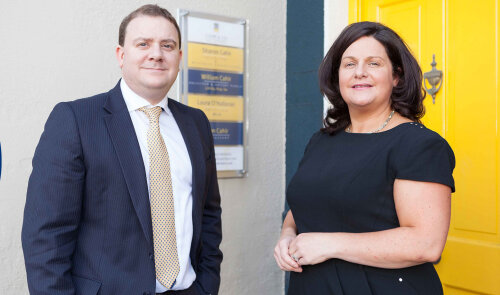Best Construction Accident Lawyers in Ennis
Share your needs with us, get contacted by law firms.
Free. Takes 2 min.
List of the best lawyers in Ennis, Ireland
About Construction Accident Law in Ennis, Ireland
Construction accidents can cause serious injury, long-term disability or death. In Ennis, County Clare, the legal framework that applies to construction site accidents is the same as the rest of the Republic of Ireland. The main objective of the law is to protect workers, contractors, visitors and the public by imposing duties on employers, contractors, designers and others involved in construction projects. If you are injured in a construction accident you may have several parallel processes to consider - medical care and social supports, workplace health and safety reporting and enforcement, and a possible civil claim for compensation. This guide explains the basics so you can take informed next steps.
Why You May Need a Lawyer
Construction accident cases are often legally and factually complex. You may need a lawyer if any of the following apply:
- Your injuries are serious, permanent or likely to require ongoing care or rehabilitation.
- Liability is disputed, or multiple parties may be responsible, such as an employer, subcontractor, designer, supplier or property owner.
- There is an ongoing Health and Safety Authority investigation or potential criminal prosecution for safety breaches.
- You need help with the Injuries Board notice process before issuing court proceedings.
- Insurers deny responsibility, make a low settlement offer or request recorded statements.
- You have an occupational disease or a condition that developed over time rather than arising from a single event.
- A family member died in a construction accident and dependents are seeking compensation for loss.
A specialist solicitor with experience in workplace personal injury and construction law can preserve evidence, advise on liability, communicate with insurers, prepare a claim through the Injuries Board if required, and represent you in court if settlement is not possible.
Local Laws Overview
Key legal instruments and institutions relevant to construction accidents in Ennis include the following:
- Safety, Health and Welfare at Work Act 2005 - sets general duties on employers, employees, contractors, designers and others to protect health and safety at work. It also enables the Health and Safety Authority to investigate accidents and to bring prosecutions for breaches.
- Safety, Health and Welfare at Work (Construction) Regulations 2013 (S.I. No. 291/2013) - contains construction-specific requirements such as risk assessment, safe systems of work, coordination between parties, site safety management and provision of information and training.
- Personal Injuries Assessment Board (Injuries Board) Act 2003 - establishes the Injuries Board system. Most personal injury claims must first be notified to the Injuries Board, which can assess a claim before a court action is started.
- Statute of Limitations Act 1957 - generally provides that personal injury claims must be brought within two years from the date of the injury or from the date of knowledge of the injury. There are exceptions and special rules for minors and for certain latent injuries.
- Health and Safety Authority (HSA) - the state regulator for workplace safety. The HSA investigates serious workplace accidents and can issue improvement or prohibition notices and bring prosecutions where breaches are found. Employers are required to notify the HSA of certain serious incidents.
- Civil law principles of negligence and vicarious liability - civil claims for compensation are usually based on negligence. Employers can be vicariously liable for the acts of employees done in the course of employment. Third parties such as designers, contractors or product manufacturers may also be liable if their carelessness caused the accident.
- Insurance and employer obligations - employers are expected to have appropriate insurance cover. Insurers play a major role in handling claims and settlement negotiations.
Frequently Asked Questions
What should I do immediately after a construction accident?
Seek medical treatment first. Inform your employer or site manager and make sure the accident is formally recorded in the site accident log. Preserve evidence where possible - take photos, keep damaged clothing, get contact details for witnesses and note the time, location and circumstances. Report the incident to the Health and Safety Authority if a serious injury or specified event has occurred. Contact a solicitor experienced in construction accidents as soon as practical.
Do I need to report the accident to anyone besides my employer?
Serious workplace accidents and certain dangerous occurrences must be reported to the Health and Safety Authority. Your employer has a legal duty to notify the HSA in specified cases. You may also need to notify the Injuries Board if you intend to pursue a personal injuries claim. If criminal activity or gross negligence is suspected, contact the Garda station.
Can I make a claim against my employer for an on-site injury?
Yes. Under civil law an employer can be liable if they fail to provide a safe workplace, adequate training or safe systems of work. Claims against employers are common in construction accident cases. In practice your claim may be handled by the employer's insurers. A solicitor can advise on prospects of success and the correct procedure to follow.
What is the Injuries Board and how does it affect my claim?
The Injuries Board provides an assessment service for personal injury claims. In most cases you must notify the Injuries Board of your claim before issuing court proceedings. The Injuries Board can make an assessment that the parties may accept or reject. If you reject an assessment or the process is not used, court proceedings may follow. Time limits still apply, so do not delay.
How long do I have to bring a claim?
In general you have two years from the date of the injury or from the date you became aware of the injury to start court proceedings, under the Statute of Limitations. There are different rules for children and for injuries that manifest later. It is important to get legal advice early so you do not miss a deadline.
What compensation can I expect if my claim succeeds?
Compensation typically covers general damages for pain and suffering, and special damages for financial losses such as loss of earnings, medical expenses, rehabilitation costs and future care needs. Each case is assessed on its own facts and damages depend on the severity and long-term impact of the injury. Your solicitor can estimate likely damages after reviewing medical reports and loss information.
Will I lose if I was partly to blame for the accident?
Not necessarily. Irish law allows for contributory negligence. If you are partly at fault, your damages award may be reduced by the percentage of your responsibility. A solicitor can advise on how contributory negligence might be applied and whether it will significantly affect your claim.
What happens if the accident caused a fatality?
If a death occurs, the HSA will investigate and may bring prosecutions if safety law breaches are found. Dependents of the deceased may have a civil claim for consequential financial loss. Claims arising from a fatal accident are legally complex and emotionally difficult, so specialist legal advice is strongly recommended early on.
Who pays legal costs if I bring a claim?
Solicitors often work on conditional fee agreements or other client-friendly arrangements for personal injury claims. If a case is successful, the court or settlement will usually include an award for legal costs and solicitor-client costs, but not all costs may be recoverable from the other side. You should discuss fees, likely expenses and funding options with a solicitor before proceeding.
Should I give a recorded statement to an insurer searching for details?
Do not give a recorded statement or sign documents supplied by an insurer without first getting legal advice. Insurers may use statements to limit liability or contest aspects of your claim. Let your solicitor handle communications with insurers while you focus on recovery and gathering evidence.
Additional Resources
These local and national bodies and organizations can help you find further information or support:
- Health and Safety Authority - regulator for workplace health and safety and the authority that investigates serious workplace accidents and enforces safety law.
- Injuries Board - statutory assessment body for personal injury claims.
- Citizens Information - practical information about social welfare supports, legal procedures and rights after an injury.
- Clare County Council - local building control and planning office for matters related to building standards and site compliance.
- Trade unions and workplace representatives - can advise members and may assist in preserving evidence and reporting breaches.
- Construction Industry Federation and other industry bodies - can provide guidance on industry standards and best practice.
- Local hospitals and occupational health services - for treatment, rehabilitation and medical records.
- Local solicitors in Ennis with expertise in personal injury and construction law - to advise and represent you.
Next Steps
If you or a loved one has been involved in a construction accident in Ennis, consider the following practical steps:
- Seek immediate medical attention and follow medical advice. Keep all medical records and receipts.
- Report the accident to your employer or site manager and ensure an official accident report is made.
- Preserve evidence - photographs, clothing, tools or equipment involved, site drawings and any safety documentation.
- Get contact details for witnesses and take contemporaneous notes about what happened and when.
- Notify the Injuries Board within the relevant time limit if you intend to pursue a personal injury claim. Consult a solicitor about whether notification is needed immediately.
- Contact a solicitor experienced in construction accidents and workplace injury claims for an early case assessment. They can advise on liability, time limits, the Injuries Board process, interactions with insurers and whether interim or urgent relief is needed.
- Cooperate with any HSA investigation and obtain independent legal advice if the HSA is involved.
- Keep records of lost earnings, receipts for expenses, and correspondence relating to the accident and any sick pay or social welfare payments received.
This guide provides an overview and practical suggestions but does not replace legal advice about your specific situation. If you need tailored advice, speak to a solicitor experienced in construction accident and workplace injury law in Ennis as soon as you can.
Lawzana helps you find the best lawyers and law firms in Ennis through a curated and pre-screened list of qualified legal professionals. Our platform offers rankings and detailed profiles of attorneys and law firms, allowing you to compare based on practice areas, including Construction Accident, experience, and client feedback.
Each profile includes a description of the firm's areas of practice, client reviews, team members and partners, year of establishment, spoken languages, office locations, contact information, social media presence, and any published articles or resources. Most firms on our platform speak English and are experienced in both local and international legal matters.
Get a quote from top-rated law firms in Ennis, Ireland — quickly, securely, and without unnecessary hassle.
Disclaimer:
The information provided on this page is for general informational purposes only and does not constitute legal advice. While we strive to ensure the accuracy and relevance of the content, legal information may change over time, and interpretations of the law can vary. You should always consult with a qualified legal professional for advice specific to your situation.
We disclaim all liability for actions taken or not taken based on the content of this page. If you believe any information is incorrect or outdated, please contact us, and we will review and update it where appropriate.










